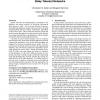Free Online Productivity Tools
i2Speak
i2Symbol
i2OCR
iTex2Img
iWeb2Print
iWeb2Shot
i2Type
iPdf2Split
iPdf2Merge
i2Bopomofo
i2Arabic
i2Style
i2Image
i2PDF
iLatex2Rtf
Sci2ools
128
click to vote
SENSYS
2006
ACM
2006
ACM
Data compression algorithms for energy-constrained devices in delay tolerant networks
Sensor networks are fundamentally constrained by the difficulty and energy expense of delivering information from sensors to sink. Our work has focused on garnering additional significant energy improvements by devising computationally-efficient lossless compression algorithms on the source node. These reduce the amount of data that must be passed through the network and to the sink, and thus have energy benefits that are multiplicative with the number of hops the data travels through the network. Currently, if sensor system designers want to compress acquired data, they must either develop application-specific compression algorithms or use off-the-shelf algorithms not designed for resource-constrained sensor nodes. This paper discusses the design issues involved with implementing, adapting, and customizing compression algorithms specifically geared for sensor nodes. While developing Sensor LZW (S-LZW) and some simple, but effective, variations to this algorithm, we show how diff...
Related Content
| Added | 14 Jun 2010 |
| Updated | 14 Jun 2010 |
| Type | Conference |
| Year | 2006 |
| Where | SENSYS |
| Authors | Christopher M. Sadler, Margaret Martonosi |
Comments (0)

